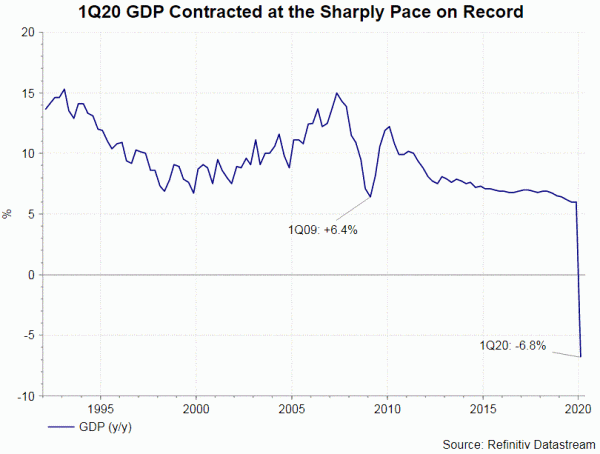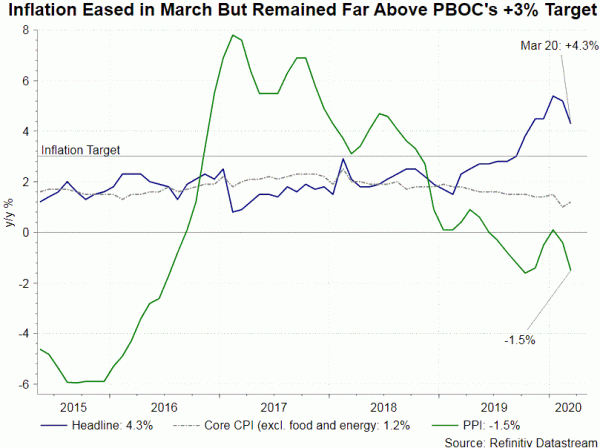After two months’ delay, the long-awaited “two sessions” will be held in two weeks’ time. The National People’s Congress (NPC) is scheduled on May 22 while the Chinese People’s Political Consultative Committee (CPPCC) is scheduled on May 21. The meetings this year have symbolic meaning from the perspective of the Chinese Communist Party (CCP). In light of skepticism about the country’s official figures of coronavirus cases, the authority, by holding the meetings, attempts to send a message to the international community that the situation in China is under control. Yet, the market is more interested in this year’s official GDP growth and inflation targets and announcement of fiscal stimulus measures.
There are several possible approaches for the growth and inflation targets this year. Before the coronavirus outbreak, it was widely anticipated that China would set a GDP growth target of +6% this year. This target is impossible to reach given the sharp contraction in the past two months. It is, however, possible that the officials would announce a lower target, say around +3%. Indeed, we believe this target is still hard to achieve. GDP contracted -9.8% q/q, or -6.8% y/y, in 1Q20. The market anticipates full year growth will decelerate to +1.8%, from +6.1% in 2019. Although China has turned vaguer in its growth targets in recent years (i.e.: adding the term “around”), allowing itself more flexibility, the actual growth rates have usually beaten the targets. It will be a disappointment if the actual growth rate this year misses the downwardly-revised target.
| GDP Growth Target | Actual Growth | |
| 2017 | Around 6.5% | 6.90% |
| 2018 | Around 6.5% | 6.60% |
| 2019 | 6-6.5% | 6.10% |
| 2020 | Around 6% (Jan F.) | ? |
The government might also not announce a growth target this year, noting that it is difficult to assess the economic developments as the unprecedented coronavirus pandemic has disrupted both the supply chain and global demand. It depends on when other countries can put the virus under control and resume normal economic activities. However, it might risk market concerns about the lack of commitment of the government to stimulate the economy.
China’s inflation soared in late-2019 amidst the sharp rise in pork price. Headline CPI rose to 8 years’ high of +5.4% y/y in January before easing to +4.3% in March. Although some are anticipating that the inflation target might be raised from the current +3%, we do not think such a change is warranted.
Another focus is fiscal stimulus in forms of, for instance, income tax cuts, subsidies for most affected sectors such as automobile and cash payments. The targets are likely SMEs, especially non-SOE SMEs. On March 27, the Politburo meeting confirmed that a comprehensive policy package will likely be announced in May. The government might raise the fiscal deficit target this year to 3.5-4%, from 3% during normal times, signaling the commitment to increase spending to boost growth. In order to finance spending, the government will issue special government bonds and local government bonds. The market expects issuance of special government bonds and local government bonds is worth of RMB 2-3 trillion and RMB 4 trillion, respectively. Any announcement below these figures could disappoint the market.


